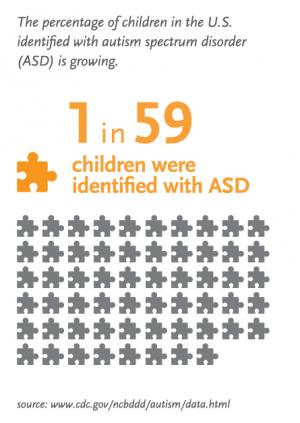Answering the Call to Serve Autistic People
“I’ve sort of been the Madonna of Mosaic,” she said with a laugh. “I’ve been able to reinvent myself over and over again.”
When she sat down with Karen Fry, Mosaic’s mental and behavioral health director, to start planning how they were going to prepare Mosaic to serve the Autism community, she drew from her own experience.
“(Growth) has been my story at Mosaic,” she said, “Because of that, I’ve been able to provide Mosaic with my best skills and strengths.”
In May, the Autism and Developmental Disabilities Monitoring Network released its latest study on the prevalence of Autism Spectrum Disorders in the United States. As in previous years, identification numbers went up.
It’s a stark increase from diagnoses 14 years ago when numbers were around 1 in 166.
According to the survey, about 1 in 59 8-year-olds, or 1.7 percent of children, surveyed were diagnosed with autism.

Nancy Potter knew Mosaic could, but she wondered, “Can we do it better?”
In the last few years, Mosaic has put an extra emphasis on training employees to serve autistic people, educating leaders with the latest research to make sure employees can support them in the best way possible.
Fry and Potter have teamed up to develop one-of-a-kind training experience for direct support professionals around autism. Potter believed that if they could build a training program that invested in direct care staff Mosaic would see great results.
“We get a chance to run a professional development track for staff and they get to grow without having to leave Mosaic,” she added.
Mosaic partnered with The International Board of Credentialing and Continuing Education Standards (IBCCES), which provides several credentialing options for professionals who work with people with intellectual and developmental disabilities.
Potter, who is certified as an autism specialist by the board, teaches online classes for employees interested in earning an autism certificate. Unlike many certification courses, it doesn’t require participants to have a master’s degree. This is key for the majority of Mosaic’s employees, who come from many different educational backgrounds.
“Our line staff really need to be able to take the concept and apply it to their actual work environment,” Potter said. “A lot of these folks have been out of the educational system for a long time.”
The program was piloted at Mosaic in Western Colorado, which provides services for more than 60 people in the Grand Junction area. Twenty-one staff members took the class at the agency. All 21 passed their certification course on their first try.
“They’ve all done amazingly well,” Potter said.
Since the program’s inception, 27 Mosaic employees earned their autism certificate.
Confidence and competence are at the core of everything Potter trains staff on.

Long-time Mosaic employee, Nancy Potter, is part of a team working on developing training programs that help direct support professionals support autistic people, a growing segment of Mosaic’s client base.
The program is one of many that Mosaic is starting to equip leaders, especially those in direct care, for the future. Other initiatives include training staff to provide mental and behavioral health support to people with intellectual and developmental disabilities who desperately need it.
At the end of the day, Potter knows these programs will make a huge difference for the people Mosaic supports.
“We know that if we have really well-trained staff, they provide better quality supports for the people we support.”


